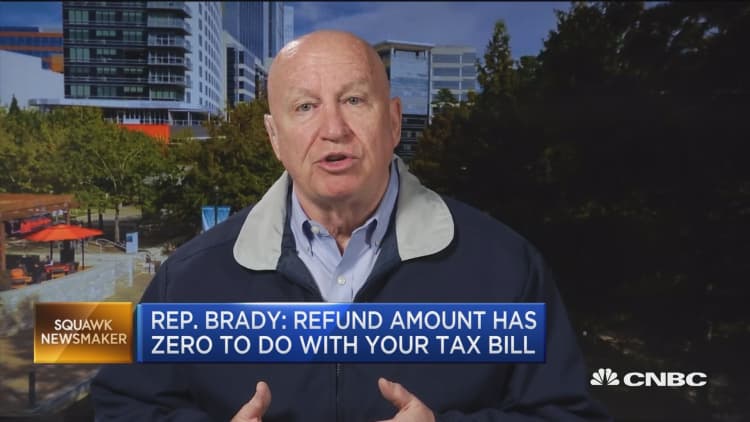
Republican Rep. Kevin Brady, the driving congressional force behind President Donald Trump's 2017 tax cut, says Americans are seeing smaller 2018 refunds because they got more of their own money in their paychecks.
"Our thinking was, in tax reform, was most families live paycheck to paycheck. It's best to drive that into their paychecks last year, starting in February or March, instead of delaying it a year," he told CNBC on Thursday.
Many alarming headlines are popping up about people being surprised by getting less money back from the government.
If people want less money in their 2019 paychecks and bigger refunds, they can increase their W-4 withholding, said Brady, now the ranking member of the House Ways and Means Committee due to the Democrats taking over the majority. He was chairman when the Trump tax package was crafted.
"Maybe this conversation will spur more people to do that," Brady said in a "Squawk Box" interview.
But in the meantime, he cautioned against extrapolating the size of the refunds based on being just a couple weeks into tax-filing season, which was hampered by a record-long government shutdown, Brady said.
"The refund picture isn't even accurate," he said. "The refunds vary from year to year. That's natural."
While workers are anecdotally complaining about smaller refunds, Treasury data show they're actually tracking slightly higher during the same time last year, according to research from Morgan Stanley.
Either way, Brady added, "it would have zero to do with your tax bill, zero to do with it; it's merely what you overpaid the IRS in the paychecks last year."
Brady — along with Senate Finance Committee Chairman Chuck Grassley, R-Iowa — also made that case in a USA Today op-ed.
Their explanation is the latest example of how the GOP's messaging on the tax law, Trump's signature legislative achievement, failed to resonate with the voting public. Polling shows that voters generally disapprove of the measure.
There have been mixed signals from Republican leadership about what kind of benefits the law would provide. In November 2017, a month before Trump signed the bill, then-Speaker of the House Paul Ryan touted bigger refunds for taxpayers.


